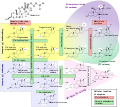Steroid hormone
(Redirected from Steroid hormones)
Steroid hormone is a type of hormone that is chemically classified as a steroid. Steroid hormones are synthesized primarily in the adrenal gland and gonads. They regulate a wide range of physiological functions, including metabolism, immune response, and reproduction.
Structure and synthesis
Steroid hormones are derived from cholesterol. The synthesis of steroid hormones involves a series of chemical reactions that modify the cholesterol molecule. The process begins in the mitochondria, where cholesterol is converted into pregnenolone by the enzyme P450scc. Pregnenolone then serves as the precursor for all other steroid hormones.
Types of steroid hormones
There are five major classes of steroid hormones: glucocorticoids, mineralocorticoids, androgens, estrogens, and progestogens. Each class has distinct physiological effects.
Glucocorticoids
Glucocorticoids, such as cortisol, regulate glucose metabolism and immune response. They are produced in the adrenal cortex.
Mineralocorticoids
Mineralocorticoids, such as aldosterone, regulate electrolyte and water balance. They are also produced in the adrenal cortex.
Androgens
Androgens, such as testosterone, are responsible for the development of male secondary sexual characteristics. They are produced in the testes.
Estrogens
Estrogens, such as estradiol, are responsible for the development of female secondary sexual characteristics. They are produced in the ovaries.
Progestogens
Progestogens, such as progesterone, prepare the uterus for pregnancy. They are also produced in the ovaries.
Function
Steroid hormones exert their effects by binding to specific intracellular receptors. The hormone-receptor complex then translocates to the nucleus, where it regulates the transcription of target genes.
See also
Transform your life with W8MD's budget GLP-1 injections from $125.
W8MD offers a medical weight loss program to lose weight in Philadelphia. Our physician-supervised medical weight loss provides:
- Most insurances accepted or discounted self-pay rates. We will obtain insurance prior authorizations if needed.
- Generic GLP1 weight loss injections from $125 for the starting dose.
- Also offer prescription weight loss medications including Phentermine, Qsymia, Diethylpropion, Contrave etc.
NYC weight loss doctor appointments
Start your NYC weight loss journey today at our NYC medical weight loss and Philadelphia medical weight loss clinics.
- Call 718-946-5500 to lose weight in NYC or for medical weight loss in Philadelphia 215-676-2334.
- Tags:NYC medical weight loss, Philadelphia lose weight Zepbound NYC, Budget GLP1 weight loss injections, Wegovy Philadelphia, Wegovy NYC, Philadelphia medical weight loss, Brookly weight loss and Wegovy NYC
|
WikiMD's Wellness Encyclopedia |
| Let Food Be Thy Medicine Medicine Thy Food - Hippocrates |
Medical Disclaimer: WikiMD is not a substitute for professional medical advice. The information on WikiMD is provided as an information resource only, may be incorrect, outdated or misleading, and is not to be used or relied on for any diagnostic or treatment purposes. Please consult your health care provider before making any healthcare decisions or for guidance about a specific medical condition. WikiMD expressly disclaims responsibility, and shall have no liability, for any damages, loss, injury, or liability whatsoever suffered as a result of your reliance on the information contained in this site. By visiting this site you agree to the foregoing terms and conditions, which may from time to time be changed or supplemented by WikiMD. If you do not agree to the foregoing terms and conditions, you should not enter or use this site. See full disclaimer.
Credits:Most images are courtesy of Wikimedia commons, and templates, categories Wikipedia, licensed under CC BY SA or similar.
Translate this page: - East Asian
中文,
日本,
한국어,
South Asian
हिन्दी,
தமிழ்,
తెలుగు,
Urdu,
ಕನ್ನಡ,
Southeast Asian
Indonesian,
Vietnamese,
Thai,
မြန်မာဘာသာ,
বাংলা
European
español,
Deutsch,
français,
Greek,
português do Brasil,
polski,
română,
русский,
Nederlands,
norsk,
svenska,
suomi,
Italian
Middle Eastern & African
عربى,
Turkish,
Persian,
Hebrew,
Afrikaans,
isiZulu,
Kiswahili,
Other
Bulgarian,
Hungarian,
Czech,
Swedish,
മലയാളം,
मराठी,
ਪੰਜਾਬੀ,
ગુજરાતી,
Portuguese,
Ukrainian
Contributors: Prab R. Tumpati, MD





